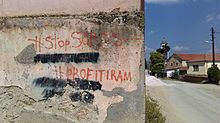George Soros facts for kids
Quick facts for kids
George Soros
|
|
|---|---|
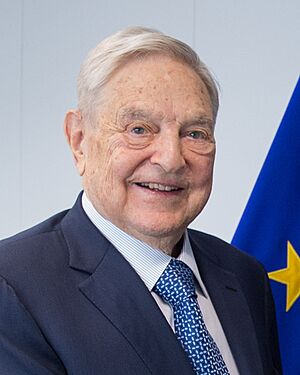
Soros in 2017
|
|
| Born |
György Schwartz
August 12, 1930 Budapest, Kingdom of Hungary
|
| Citizenship | Hungarian American |
| Education | London School of Economics (BSc, MSc) |
| Occupation |
|
| Known for |
|
| Spouse(s) |
Annaliese Witschak
(m. 1960; div. 1983)Susan Weber
(m. 1983; div. 2005)Tamiko Bolton
(m. 2013) |
| Children | 5, including Robert, Jonathan and Alexander |
| Parent(s) |
|
| Relatives | Paul Soros (brother) |
| Awards | Presidential Medal of Freedom (2025) |
George Soros (born György Schwartz on August 12, 1930) is an American investor and a generous giver. He is known for managing large investment funds and for donating billions of dollars to various causes around the world. As of July 2025, he has given away a large part of his wealth to his Open Society Foundations. In 2020, Forbes magazine called him the "most generous giver" based on the percentage of his wealth he has donated.
Soros was born in Budapest, Hungary, to a Jewish family. He survived the Nazi occupation of Hungary during World War II. In 1947, he moved to the United Kingdom. He studied philosophy at the London School of Economics, earning his bachelor's degree in 1951 and a master's degree in 1954.
He started his career in banking before creating his first hedge fund in 1969. A hedge fund is a type of investment fund that uses different strategies to try and make money for its investors. The profits from this first fund helped him start Soros Fund Management in 1970. His main fund, the Quantum Fund, grew from $12 million to $25 billion by 2011.
Soros became famous as "The Man Who Broke the Bank of England" in 1992. He made a large profit by betting against the British pound during a currency crisis. He also developed a theory called reflexivity. This idea suggests that people's beliefs and actions can actually change how markets behave, leading to big ups and downs.
Through his Open Society Foundations, Soros supports causes that promote progressive and liberal ideas. He has given billions of dollars to help reduce poverty, increase transparency, and support education globally. He played a role in the fall of communism in Eastern Europe in the late 1980s and early 1990s. He also provided a large amount of money to the Central European University in his hometown of Budapest.
Contents
Early Life and Education
George Soros was born György Schwartz on August 12, 1930, in Budapest, Hungary. His family was Jewish and well-off. His father, Tivadar Soros, was a lawyer and wrote books in Esperanto, a language created to be easy to learn and used internationally. Tivadar had been a prisoner of war during World War I and escaped from Russia.
In 1936, Soros's family changed their last name from "Schwartz" to "Soros." This was a way to protect themselves as feelings against Jewish people grew stronger in Hungary. His father liked the new name because it reads the same forwards and backward (a palindrome) and means "next" in Hungarian and "will soar" in Esperanto.
When Soros was 13, in March 1944, Nazi Germany took control of Hungary. Jewish children were not allowed to go to school. Soros and his family survived the war by getting fake documents that said they were Christians. His father helped not only their family but also many other Hungarian Jews. Soros later said that 1944 was "the happiest [year] of his life" because he saw his father's bravery.
After the war, Soros moved to Paris and then to England. He became a student at the London School of Economics. To pay for his studies, he worked as a railway porter and a waiter. He also received help from a charity. He earned his bachelor's degree in philosophy in 1951 and his master's degree in 1954. After graduating, he wanted to be a professor but decided to work in finance instead.
Financial Career
Starting in Finance
In 1954, Soros began his career at a bank in London called Singer & Friedlander. He worked as a clerk and later in a department that dealt with arbitrage. Arbitrage is a way to make money by finding small price differences for the same thing in different markets.
In 1956, Soros moved to New York City. He worked as a trader, focusing on European stocks. These stocks were becoming popular with American investors.
Developing the Reflexivity Theory
While working in finance, Soros developed his theory of reflexivity. This idea builds on the teachings of his professor, Karl Popper. Reflexivity suggests that market prices are not just based on facts. They are also influenced by the beliefs and feelings of the people trading in the market. These beliefs can create a cycle where ideas and events affect each other, leading to big ups and downs in the market. Soros believed that understanding this helped him succeed in finance.
Founding Soros Fund Management
In 1969, Soros started his first hedge fund, called Double Eagle. He used $250,000 of his own money and $4 million from other investors. In 1970, he founded Soros Fund Management and became its leader.
By 1973, the Double Eagle Fund had grown to $12 million. Soros then created the Soros Fund, which later became known as the Quantum Fund. He and his partner, Jim Rogers, reinvested their earnings, helping the fund grow even more. By 1981, the fund was worth $400 million.
In July 2011, Soros announced that he would no longer manage money for outside investors. Instead, he would focus on investing his family's fortune. This was partly due to new rules that he felt would make it harder to keep his investors' information private. The Quantum Fund has been very successful, generating billions of dollars in profits since it started.
Major Economic Events
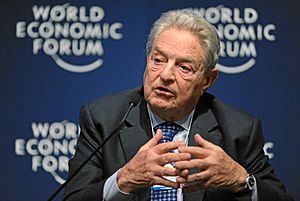
Soros is famous for his actions during "Black Wednesday" in September 1992. He had been betting that the British pound would fall in value. He believed the UK's currency was too high compared to other European countries. On September 16, 1992, his fund sold over $10 billion worth of pounds. The UK government eventually had to withdraw the pound from the European Exchange Rate Mechanism, causing its value to drop. Soros made an estimated profit of over $1 billion from this. He was called "the man who broke the Bank of England."
During the 1997 Asian financial crisis, some leaders, like the prime minister of Malaysia, accused Soros of causing the crisis. Soros explained that his fund had simply seen problems in the Asian economies and had made investments based on those observations. He stated that his fund was actually buying currencies when they started to fall, not selling them to cause the crash.
Soros has also spoken about the late-2000s recession. He called it the most serious crisis since the 1930s. He believes that markets can sometimes get into "boom/bust cycles" where they grow too fast and then crash. In response to this crisis, he started the Institute for New Economic Thinking in 2009. This group brings together experts to find new ways to understand and improve the global economy.
Political Involvement
Soros has been a significant donor to political causes, especially in the United States. Before 2004, he wasn't a major political donor, but he then started giving large amounts to groups that supported the Democratic Party.
In 2009, he donated $35 million to New York State to help underprivileged children. He also supports the Center for American Progress, a group that works on progressive ideas.
Soros has also given money to support candidates who want to reform the criminal justice system in the United States. He has donated to campaigns for local prosecutors who aim to reduce incarceration and address issues like police misconduct.
Central and Eastern Europe
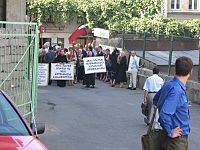
Soros has played a big role in helping countries in Central and Eastern Europe become more open and democratic after the fall of communism. Starting in 1979, he supported groups and individuals who were working for change in countries like Poland and Czechoslovakia.
In 1984, he started his first Open Society Institute in Hungary. His funding has helped scientists and universities in former Soviet countries. For example, a 2017 study found that his grants helped scientists stay in their fields and increased their research publications.
Some of his efforts have faced challenges. In some countries, like Kazakhstan and Turkmenistan, his pro-democracy programs have been banned. In 1997, he closed his foundation in Belarus after the government fined it, which Soros called an attempt to "destroy independent society."
More recently, the government in Hungary has criticized George Soros, especially regarding his views on the 2015 European migrant crisis. They have used public campaigns against him, saying he wants to change Hungary's identity. In response, Soros's Open Society Foundations moved its main office from Budapest to Berlin in 2018, citing a difficult environment in Hungary.
Death and Dying
From 1994 to 2003, Soros supported the Project on Death in America. This project aimed to better understand and improve the experience of dying and grieving. He has also supported laws that allow terminally ill people to choose to end their lives with medical assistance, such as the Oregon Death with Dignity Act.
Conspiracy Theories and Threats
Because of his wealth and his work in philanthropy, George Soros has sometimes been the subject of conspiracy theories. These theories often connect him to various global plots. Some of these ideas have been criticized for being antisemitic.
In October 2018, a pipe bomb was found in the mailbox at Soros's home in New York. This was part of a series of similar bombs sent to other public figures. The person responsible was later arrested and sentenced to prison.
Political and Economic Views
Reflexivity and Markets
Soros's main idea in economics is reflexivity. He believes that people's opinions and actions in financial markets can actually change the basic facts of the economy. For example, if many people believe house prices will go up, they might buy more houses, which then makes prices go up, proving their belief right for a while. This can create "bubbles" where prices rise too high and then crash.
He argues that traditional economic theories don't always explain what happens in markets, especially during times of rapid change or crisis. His ideas gained more attention after the 2008 financial crisis.
Views on the Free Market System
Soros believes that the current system of financial speculation can harm economic development, especially in developing countries. He thinks that relying too much on markets to fix themselves, without any government involvement, can lead to problems.
Market Predictions
Soros has written several books where he predicted financial problems. He says his own success comes from knowing when he is wrong and being able to change his mind quickly. In 2009, he said the world financial system had largely fallen apart and would take a long time to recover. In 2016, he predicted another financial crisis similar to 2008, based on global currency and stock markets.
Views on the U.S.
Soros has been a vocal critic of some U.S. government policies. In 2003, he said that removing President George W. Bush from office was a major goal for him. He believed that the "War on Terror" was a mistake and created more problems.
In 2017, Soros described Donald Trump as a "con man" and predicted that his ideas would not succeed. He also expected financial markets to struggle under Trump's policies.
Views on Europe
Soros has called for stronger economic cooperation in Europe, especially after the Great Recession. He believes that European countries need to work together more closely to solve economic problems and avoid nationalistic solutions. He is against Brexit (the UK leaving the European Union) and has donated money to groups that oppose it.
In 2018, Soros pointed out that Europe faces big challenges like immigration, economic hardship, and countries leaving the EU. He believes that these issues, along with the rise of populism, threaten the future of the European Union.
Views on China
Soros has expressed concerns about China's growing economic and political power. In 2010, he said that China needs to take more responsibility for global order. In 2019, he called Chinese President Xi Jinping "the most dangerous opponent of open societies." He also warned against Chinese technology companies like Huawei dominating the 5G market, calling it a security risk. Soros is critical of American companies that ignore human rights issues in China for business reasons.
Views on Russia and Ukraine
Soros has supported Ukraine since before it became independent from Russia. In 2015, he urged Western countries to increase economic penalties against Russia for its support of separatists in eastern Ukraine. He believes that Russia's actions, like taking control of Crimea, challenge the global order. In November 2015, Russia banned Soros's Open Society Foundations, saying they posed a threat to the country's security.
In May 2022, Soros stated that the Russian invasion of Ukraine could lead to a "third world war" and that Russia must be defeated quickly.
Views on India and Narendra Modi
In February 2023, Soros criticized Indian Prime Minister Narendra Modi, accusing him of being authoritarian and promoting violence against Muslims. Modi's political party, the Bharatiya Janata Party, accused Soros of trying to undermine India's democracy.
Wealth and Philanthropy
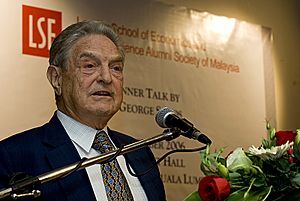
As of March 2020, Forbes magazine estimated George Soros's wealth at $8.3 billion. He has given away a significant portion of his original fortune, with over $15 billion distributed through his Open Society Foundations. This organization supports justice, education, public health, and independent media around the world. Forbes has recognized him as one of the most generous givers.
Soros began his philanthropic work in the 1970s. He provided funds to help Black students attend the University of Cape Town in apartheid South Africa. He also supported groups working against communism behind the Iron Curtain.
His philanthropic efforts focus on promoting non-violent democracy in countries that were once communist. These efforts are mainly carried out through the Open Society Foundations. By 2003, it was estimated he had given away $4 billion. In recent years, the Open Society Foundations has spent about $500 million annually.
In 2003, Paul Volcker, a former head of the U.S. central bank, praised Soros for using his wealth to help countries become "open societies." This means societies that are not only free for business but also open to new ideas and different ways of thinking.
Other notable projects include helping scientists and universities in Central and Eastern Europe, providing aid to civilians during the siege of Sarajevo, and supporting Transparency International, an organization that fights corruption. Soros also gave a large amount of money to the Central European University.
In September 2006, Soros pledged $50 million to the Millennium Promise, a project led by economist Jeffrey Sachs. This project aims to provide education, agricultural help, and medical aid to villages in Africa struggling with poverty.
In May 2011, Soros donated $60 million to Bard College to create a center for civic engagement. In October 2017, he transferred $18 billion to the Open Society Foundations, making it one of the largest foundations in the world. In October 2018, Soros donated $2 million to the Wikimedia Foundation, which supports Wikipedia.
In January 2020, Soros announced a $1 billion donation to establish the Open Society University Network. This is a global network of educational institutions working with Bard College and the Central European University. In July 2020, his foundations announced plans to give $220 million for racial justice groups and criminal justice reform. He also donated an additional $100 million to Bard College in July 2020 and pledged $500 million to its endowment in April 2021, one of the largest donations ever to higher education in the U.S.
Personal Life
Soros has been married three times. His first marriage was to Annaliese Witschak in 1960, and they had three children: Robert, Andrea, and Jonathan. They divorced in 1983.
In 1983, he married Susan Weber, and they had two children: Alexander and Gregory. They divorced in 2005.
In 2013, George Soros married Tamiko Bolton. His older brother, Paul Soros, who was also an investor and philanthropist, passed away in 2013. As of 2022, Soros owns homes in Manhattan, Long Island, and Katonah, New York.
As a child, Soros sometimes imagined himself as a powerful figure. He has said that he is not religious and does not believe in God.
Honors and Awards
Soros has received several honorary degrees from universities, including the University of Oxford and Yale University. In 1995, he received an honorary degree in economics from the University of Bologna.
In 2008, Soros was recognized for his success in finance and was included in Institutional Investors Alpha's Hedge Fund Manager Hall of Fame. In 2014, he was ranked number 1 on a list of top managers for making nearly $42 billion since his Quantum Endowment Fund started in 1973.
In 2017, he was made an Honorary Fellow of the British Academy, which is the UK's national academy for humanities and social sciences. The Financial Times named him their Person of the Year for 2018, describing him as a supporter of liberal democracy.
In April 2019, Soros received the Ridenhour Prize for Courage. In January 2025, United States President Joe Biden awarded Soros the Presidential Medal of Freedom, one of the highest civilian awards in the U.S.
Publications
Soros has written many books about finance, economics, and society. Some of his books include:
- The Tragedy of the European Union: Disintegration or Revival? (2014)
- The New Paradigm for Financial Markets: The Credit Crisis of 2008 and What it Means (2008)
- The Age of Fallibility: Consequences of the War on Terror (2006)
- The Bubble of American Supremacy: Correcting the Misuse of American Power (2003)
- The Crisis of Global Capitalism: Open Society Endangered (1998)
- Soros on Soros: Staying Ahead of the Curve (1995)
- The Alchemy of Finance (1988)
Interesting facts about George Soros
- Soros's father was a well-known speaker of Esperanto. This is a language created to be easy for people from different countries to learn. His father taught him to speak it too.
- In Hungarian, soros means "next in line." In Esperanto, it means "will soar."
- When he was a student, Soros worked as a railway porter and a waiter.
- As of October 2023, his net worth was about US$6.7 billion.
- Soros is known as one of the most generous givers. He has donated 64% of his original fortune.
George Soros quotes
- "The main difference between me and other people who have amassed this kind of money is that I am primarily interested in ideas, and I don't have much personal use for money."
- "Discount the obvious, bet on the unexpected."
- "The hardest thing to judge is what level of risk is safe."
- "If investing is entertaining, if you're having fun, you're probably not making any money. Good investing is boring."
- "It's more difficult, you know, to bring about positive change than it is to make money."
Images for kids
See also
 In Spanish: George Soros para niños
In Spanish: George Soros para niños
 | Leon Lynch |
 | Milton P. Webster |
 | Ferdinand Smith |


